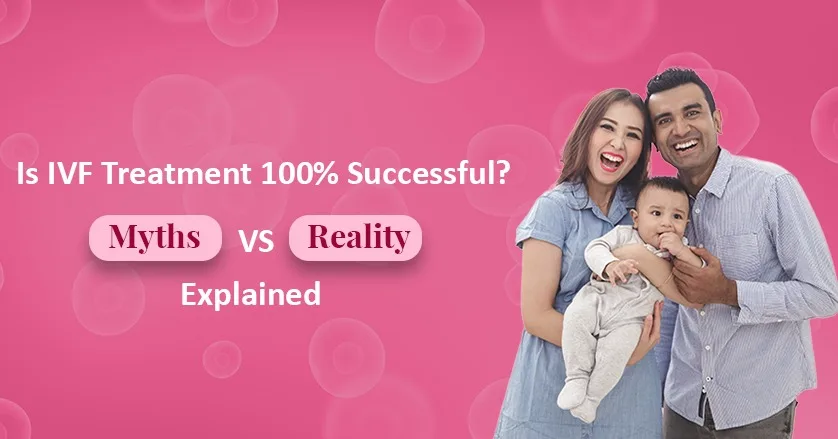In vitro fertilization (IVF) is one of the most widely known and practiced fertility treatments. Many couples turn to IVF with hopes of starting a family — but the most common question remains: “Is IVF treatment 100% successful?” The answer is more nuanced than a simple yes or no. Let’s break down the facts and dispel common myths around IVF success rates.
What is IVF and How Does it Work?
IVF (In Vitro Fertilization) is a process where a woman’s eggs are retrieved and fertilized with sperm in a laboratory. The fertilized embryo is then transferred back into the uterus. IVF is a widely used female infertility treatment for conditions like blocked fallopian tubes, ovulation disorders, endometriosis, or unexplained infertility.
Is IVF Treatment 100% Successful?
No, IVF is not 100% successful.
While medical advancements have improved success rates significantly, no fertility treatment offers a guaranteed result. IVF success depends on several factors:
-
Age of the woman
-
Quality of eggs and sperm
-
Lifestyle factors (e.g., smoking, alcohol, weight)
-
Underlying health conditions
-
Previous pregnancy history
On average, IVF success rates are:
-
35–45% for women under 35
-
25–35% for women aged 35–40
-
10–15% for women over 40
Choosing the Right IVF Centre Matters
If you’re considering IVF, the choice of clinic can make a significant difference in outcomes. The best IVF centre in Delhi will offer:
-
Highly experienced fertility specialists
-
Modern lab technology (embryo freezing, ICSI, genetic testing)
-
Personalized treatment plans
-
Transparent pricing and ethical practices
Always ask for the clinic’s live birth success rates and talk to former patients when possible.
Realistic Expectations and Emotional Readiness
While IVF brings hope, it may also come with emotional ups and downs. Couples must prepare for the possibility of multiple cycles, as it may take more than one attempt to achieve pregnancy. Psychological support and counselling can be extremely beneficial during this time.
IVF as a Part of Female Infertility Treatment
IVF is one of the most advanced forms of female infertility treatment, but it’s not the only one. Depending on the cause of infertility, your fertility specialist may recommend:
-
Ovulation induction
-
Intrauterine insemination (IUI)
-
Laparoscopic surgery (for endometriosis or fibroids)
IVF is usually advised when other methods are unsuccessful or when there’s a clear medical indication.
Final Thoughts
IVF is a powerful solution for many couples struggling with infertility, but it’s not a miracle cure. While it doesn’t guarantee success, the right guidance, preparation, and medical team can dramatically improve your chances. If you’re searching for the best IVF centre in Delhi, make sure to research thoroughly and consult a trusted fertility expert.
Need help starting your IVF journey? Connect with a qualified specialist today for personalized female infertility treatment.
Frequently Asked Questions
Question:1 Is IVF 100% successful on the first try?
Ans: No, IVF is not guaranteed on the first attempt. Many women may require 2–3 cycles for a successful pregnancy depending on their age and fertility health.
Question:2 What is the success rate of IVF treatment?
Ans: IVF success rates vary by age. For women under 35, success rates range from 35% to 45% per cycle, decreasing with age.
Question:3 How many IVF attempts are usually needed?
Ans: Many couples succeed within 3 cycles. However, the number of attempts varies based on age, fertility diagnosis, and clinic quality.
Question: 4 Does the best IVF centre in Delhi improve my chances?
Ans: Yes. Choosing the best IVF centre in Delhi with advanced technology and skilled doctors increases your chances of success.
Question: 5 What are other options for female infertility treatment?
Ans: Besides IVF, treatments include ovulation induction, IUI, and laparoscopic surgery, depending on the underlying cause.

